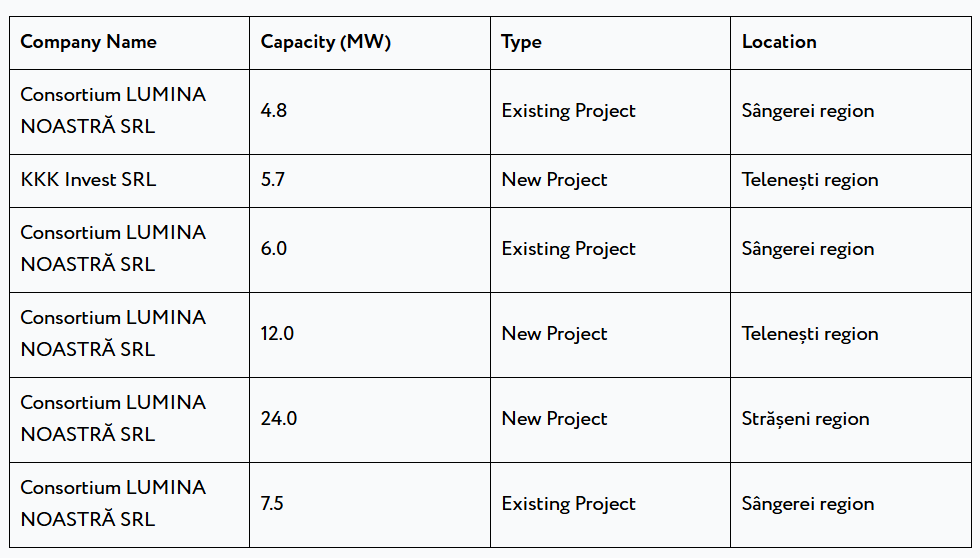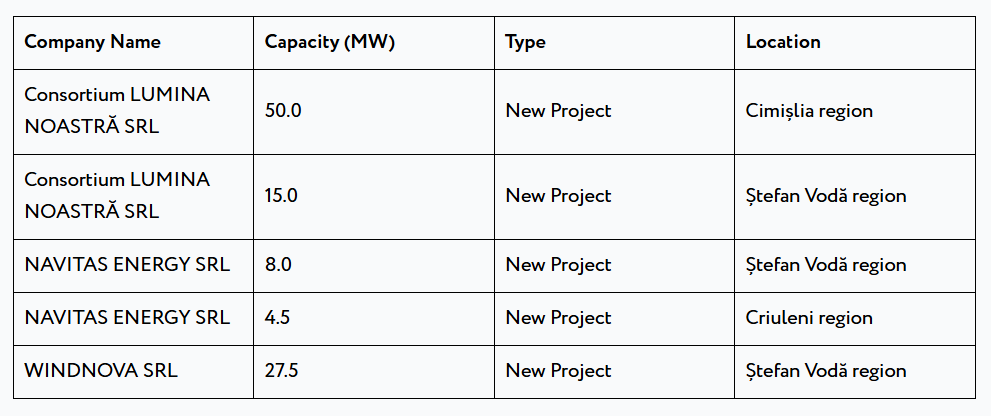In 2024, renewable energy production in the Republic of Moldova doubled compared to the previous year, marking significant progress in the country’s transition toward a more diversified and resilient energy infrastructure. Against this backdrop, Moldova has launched its first major green energy initiative: a tender for awarding the status of ”large eligible producer” initiated in March 2025. The tender concluded with promising results, underscoring strong investor interest in the sustainable development of the energy sector, as stated in an article by Invest Moldova.
The inaugural round of tenders, launched by the Ministry of Energy, targeted onshore wind power plants with a capacity of 105 MW and photovoltaic plants with 60 MW. The process drew substantial attention from the business community, attracting a total of 42 bids with a proposed capacity exceeding 444 MW—nearly three times more than the available quota.
”We are genuinely encouraged by the extraordinary interest shown by investors—over 40 projects submitted for our first public tender is a clear sign that Moldova is becoming an attractive market for renewable energy. This level of participation demonstrates that the business community trusts our direction and the state’s commitment to transparency, predictability, and fair competition. It is a promising beginning and a strong boost for our energy transition,” said Dorin Junghietu, Minister of Energy of the Republic of Moldova.
About €200 Million in Investments and a Stable Framework for Investors
To stimulate investment, the state will provide the winners—selected based on the lowest bid price—with the guarantee of a fixed electricity price for 15 years. The winning prices fell within the limits set by the National Energy Regulatory Agency (NERA): 1.5 MDL/kWh for wind energy and 1.67 MDL/kWh for solar, contributing to a competitive and predictable investment climate.
FOR THE MOST IMPORTANT NEWS, FOLLOW US ON TWITTER!
Developers must invest over €190 million in total and complete construction of their power plants within the next three years, as required by the tender.
Local Strength in Solar, International Expertise in Wind
The tender results highlight a strong mobilization and growing interest from local investors. Two Moldovan-owned companies submitted all six winning solar project proposals. Three of the six projects already exist, while developers plan to build the remaining three.

Three companies—two backed by foreign capital—will implement five new wind energy projects, bringing international expertise to the initiative.
”This tender marks a milestone for the Republic of Moldova—successfully creating a free and competitive market in the green energy sector, where both local and foreign capital companies competed openly. It’s a clear sign that Moldova’s investment environment is maturing and becoming increasingly attractive for strategic projects,” stated Natalia Bejan, Director of Invest Moldova Agency.

Advancing Toward Energy Independence
The impact of these projects will be felt in the national energy mix as early as the coming months. In April 2025, Moldova reached a record: 36% of the country’s electricity consumption came from renewable sources. This progress brings Moldova even closer to its national target of 30% of total energy consumption from renewables by 2030, according to the Integrated National Energy and Climate Plan.
Continuing the Commitment: A New Tender in Autumn 2025
The Ministry of Energy has announced active preparations for the second round of tenders, scheduled for autumn 2025. Carolina Novac, State Secretary at the Ministry of Energy, stated: ”With this first tender, we’ve managed to strengthen Moldova’s core renewable energy generation capacity—an essential step toward our energy security. In the next round, we aim even higher: expanding not only generation capacity but also storage systems to build a balanced, flexible, and future-ready energy system.”
The upcoming tender will include a proposed 173 MW of wind capacity and approximately 22 MW of battery energy storage systems (BESS), with the primary objective of ensuring grid stability.


